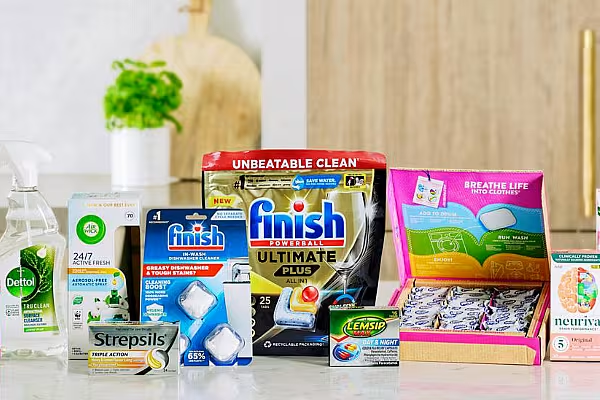Consumer goods group Reckitt's like-for-like sales growth beat estimates in the first quarter as more people bought its Lysol, Dettol and Finish cleaning products even as prices rose, it said in a trading update.
The UK-based company said it was on track to meet full-year revenue and profit targets, led by mid-single-digit growth across its health and hygiene businesses.
Reckitt's quarterly like-for-like net sales rose 1.5%, against 0.9% growth expected by analysts in a poll by the company.
'Balanced Contribution
"We have delivered a good first quarter," commented Kris Licht, chief executive. "Following a period of price-led growth, we are now returning to a more balanced contribution from price, mix and volume.
"We grew volumes in many of our powerbrands in the quarter, including Lysol, Dettol, Durex and Finish, as well as our non-seasonal OTC portfolio. In addition, we continue to benefit from carryover pricing and consumers trading up to our premium innovations."
Consumer companies from Reckitt to Nestlé have invested heavily in product innovation to win back shoppers who had turned to cheaper brands during the COVID-19 pandemic and more recent cost-of-living crisis in the belief that improvements to existing products will allow them to raise prices without taking a hit on sales volumes.
Hygiene Volume Growth
Reckitt said first-quarter volumes rose 2.9% at the company's hygiene business - its largest by revenue - but the price/mix metric that shows how much its products sold for rose by 4.2%.
The company's overall price/mix ratio rose 2% while volumes declined by 0.5%. Analysts had expected a 2.2% price/mix gain and volumes to decrease by 3.2%.
Reckitt's products include Nurofen tablets, cold remedy Lemsip and Durex condoms.
Analyst Viewpoint
Commenting on the group's performance, AJ Bell investment director Russ Mould said, “The only bit of the business that seems to be firing on all cylinders is the hygiene arm, with gains in both price and volume. Reckitt notes that customers are starting to trade up to what it calls ‘more superior’ products. That is music to the ears of investors who have been waiting for a pivot in the landscape for big brand owners, hence the share price jump on the news.
“In a nutshell, we’ve seen the public trade down in recent years to supermarket own-brand or cheaper alternatives amid the cost-of-living crisis. That’s been a testing time for companies like Reckitt which rely on the power of the brands to shift goods. If the tide is now turning, it’s positive for Reckitt although this trend needs to extend across all its portfolio to really make a difference."
Additional reporting by ESM














